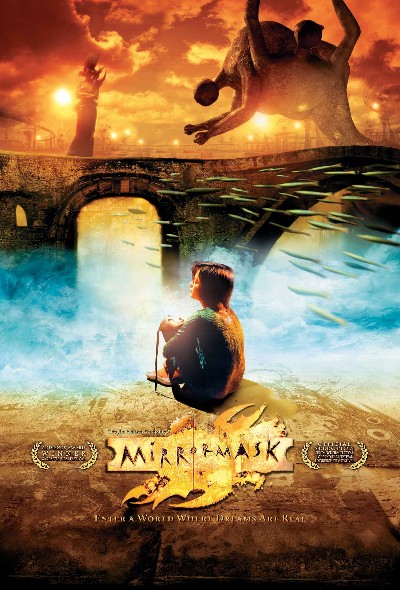MirrorMask, 2005
Starring Stephanie Leonidas and Jason Barry
Synopsis (from IMDB):
Helena, a 15-year-old girl in a family of circus entertainers, often wishes she could run off and join real life. After a fight with her parents about her future plans, her mother falls quite ill and Helena is convinced that it is all her fault. On the eve of her mother’s major surgery, she dreams that she is in a strange world with two opposing queens, bizarre creatures, and masked inhabitants. All is not well in this new world – the white queen has fallen ill and can only be restored by the MirrorMask, and it’s up to Helena to find it. But as her adventures continue, she begins to wonder whether she’s in a dream, or something far more sinister.
My Thoughts:
In the same tradition as Labyrinth or The Neverending Story, this film follows a girl who’s imagination takes her into a fantasy world. This world is dark and visually stunning, and the the film is bursting with artistic creativity.
The film opens with one white and one black puppet, which turn out to be the girls socked feet. This theme of black and white, of dark and light, of the good and bad within everyone is explored throughout the film, and merely foreshadowed here. It is this theme that I would also like to explore throughout this post.
After the puppet show we have the inciting incident, an argument between Helena (Stephanie Leonidas) and her mother (Gina McKee) over growing up and the world of circus life. Shortly afterwords Helena’s mother is hospitalized and Helena blames herself wishing she had not been so mean. This incident is processed through Helena’s imagination as we take a journey with her to an alternate world created by her drawings and dreams.
On this journey she soon meets a juggler (Jason Barry):
Valentine: What did you say your name was?
Helena: Helena.
Valentine: Helena. Helen. Helen-nun-nuh… it’s a bit drab, isn’t it? You know, you should think about changing that. Go for something with a bit of dignity and style, mixed with a bit of romance. Something like… ‘Valentine’.
Helena: Why? What’s your name?
Valentine: Valentine.
Valentine proves to be a friend and ally as they journey together to fight the shadow enveloping this fantasy land. They soon discover the White Queen is asleep and the Black Queen (both played by the actress who plays Helena’s “real” mother) is mourning her lost daughter, the Anti-Helena, causing the balance to be upset. These are two aspects of her mother, and two aspects of herself, and we soon discover two aspects of Valentine when he sells her out to the Black Queen for reward money.
“In man there are two natures; his spiritual or higher nature and his material or lower nature. In one he approaches God, in the other he lives for the world alone. Signs of both these natures are to be found in men. In his material aspect he expresses untruth, cruelty and injustice; all these are the outcome of his lower nature. The attributes of his Divine nature are shown forth in love, mercy, kindness, truth and justice, one and all being expressions of his higher nature. Every good habit, every noble quality belongs to man’s spiritual nature, whereas all his imperfections and sinful actions are born of his material nature. If a man’s Divine nature dominates his human nature, we have a saint.”
~ `Abdu’l-Bahá
Valentine redeems himself and helps rescue Helena, but they fear it is too late, that she may be trapped in this world because the escaped Anti-Helena is quickly tearing down the drawings and burning them. In the end she makes it back, more aware of the bad behavior in her, and the importance of both forgiveness and apology. This story is one of growth, and reflection. We all have masks but what we need are mirrors, mirrors that can help us see how our thoughts and actions effect other people and have consequences. Helena learns this, and cultivates the virtues of forgiveness and responsibility along the way, and grows to be a better person.
- “To err is human, to forgive divine.”
Your thoughts?

